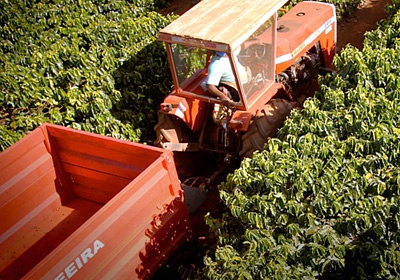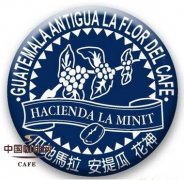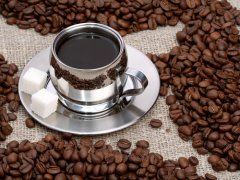Brazil, the world's largest producer of coffee beans.

The continuous drought in Brazil since the beginning of this year has seriously affected coffee bean production. The reduction in coffee production in Brazil has directly pushed up the price of coffee beans in the international market and may affect the coffee retail industry. Here, Brazilian coffee beans have also attracted the attention of the world.
Brazil is vividly compared to the "giant" and "monarch" of the coffee world. In fact, all blends run by big roasters contain some coffee from Brazil, and the vast majority of espressos are made mainly from Brazilian coffee.
Before World War II, Brazil accounted for 50% or more of the world's coffee production, now close to 30%, but the country's impact on the world coffee, especially on coffee prices, is significant. For example, two frost disasters in 1994 caused a sharp rise in global coffee prices. The continuous drought in Brazil since the beginning of this year has seriously affected the production of coffee beans. The decline in coffee production in Brazil has directly pushed up the price of coffee beans in the international market and may affect the coffee retail industry.
As there are so many kinds of Brazilian coffee in Brazil, you can't just use the word "Brazilian coffee" to include it. Like other Arabica coffee, Brazilian coffee is called Brazils to distinguish it from Milds coffee. The vast majority of Brazilian coffee is unwashed and sun-dried and is classified according to the name of the state of origin and port of transport. Although most of Brazil's 21 states grow coffee, total production is mainly concentrated in Parana, Sao Paulo, Minas Gerais, Espirito Santo and Bahia, which alone account for 55 per cent of Brazil's total production.

Although coffee is diverse, Brazilian coffee is suitable for the taste of the public. For example, coffee produced in the northern coastal areas has a typical iodine taste, reminiscent of the sea after drinking. This coffee is exported to North America, the Middle East and Eastern Europe.
Today, Brazil's brand as the origin of specialty coffee has been established, and the Brazilian Special Coffee Association (BSCA), which has many of Brazil's most important producing areas, represents the interests of the world's top coffee growers and the most advanced coffee production technology. In Missouri, for example, production has soared in the central region of Serrado over the past few years. Here, the vast Datterra plantation is not only the largest plantation in the world, but also a benchmark for producing high-quality coffee. Traditional coffee plantations in the south of the state, such as Lapanema, Alfenas and Vista Allegre, also regularly produce some of the region's top coffee.



Brazil's growth in the coffee industry may be due to the regular coffee competition held in Brazil, usually hosted by the Italian Federation of espresso roasters and the "International winning Cup" coffee judging committee. These competitions not only attract people's attention to Brazilian high-quality coffee, but also drive the market price of Brazil's top coffee.

Top Brazilian coffee may not always be easy to get. Because, after the United States, Brazil itself has become the world's largest consumer of coffee and is still growing rapidly. A large number of high-quality coffee has found a place in the home market, and consumers' tastes are becoming more and more picky.

Shepherd Coffee is fully committed to sharing boutique coffee life and focusing on boutique coffee shop solutions.
Shepherd coffee beans adhere to the origin of procurement, the optimization of raw beans, meticulous baking, round and full, professional packaging.
Important Notice :
前街咖啡 FrontStreet Coffee has moved to new addredd:
FrontStreet Coffee Address: 315,Donghua East Road,GuangZhou
Tel:020 38364473
- Prev

Guatemala Antigua Flower Coffee Guatemala grows coffee
Coffee was really introduced into Guatemala in 1750 by Father Jesuit, where the coffee industry was developed by German colonists at the end of the 19th century. Today, most of the coffee industry's production takes place in the south of the country. Guatemala has seven main coffee producing areas: Antigua (Antigua), Cobain (Coban), Lake Attilan (Atitlan), Vevetnango (Huehuetenango)
- Next

Advantages and disadvantages of drinking coffee drinking coffee can also cause cancer
Many people like to drink coffee, but many nutritionists have put forward different views. some people think that coffee can fight cancer, but it is said that coffee hurts the stomach, so is drinking coffee good or bad? Is coffee really what people say it is? The editor will explain it in detail below. Coffee is the extract of coffee beans, which contains no less than hundreds of ingredients. Among them, caffeine is undoubtedly the heaviest
Related
- Detailed explanation of Jadeite planting Land in Panamanian Jadeite Manor introduction to the grading system of Jadeite competitive bidding, Red bid, Green bid and Rose Summer
- Story of Coffee planting in Brenka region of Costa Rica Stonehenge Manor anaerobic heavy honey treatment of flavor mouth
- What's on the barrel of Blue Mountain Coffee beans?
- Can American coffee also pull flowers? How to use hot American style to pull out a good-looking pattern?
- Can you make a cold extract with coffee beans? What is the right proportion for cold-extracted coffee formula?
- Indonesian PWN Gold Mandrine Coffee Origin Features Flavor How to Chong? Mandolin coffee is American.
- A brief introduction to the flavor characteristics of Brazilian yellow bourbon coffee beans
- What is the effect of different water quality on the flavor of cold-extracted coffee? What kind of water is best for brewing coffee?
- Why do you think of Rose Summer whenever you mention Panamanian coffee?
- Introduction to the characteristics of authentic blue mountain coffee bean producing areas? What is the CIB Coffee Authority in Jamaica?

